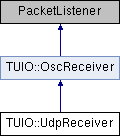TUIO::UdpReceiver Class Reference
#include <UdpReceiver.h>
Inheritance diagram for TUIO::UdpReceiver:

Public Member Functions | |
| UdpReceiver (int port=3333) | |
| virtual | ~UdpReceiver () |
| void | connect (bool lock=false) |
| void | disconnect () |
 Public Member Functions inherited from TUIO::OscReceiver Public Member Functions inherited from TUIO::OscReceiver | |
| OscReceiver () | |
| virtual | ~OscReceiver () |
| bool | isConnected () |
| void | addTuioClient (TuioClient *client) |
| void | ProcessPacket (const char *data, int size, const IpEndpointName &remoteEndpoint) |
Public Attributes | |
| UdpListeningReceiveSocket * | socket |
Additional Inherited Members | |
 Protected Member Functions inherited from TUIO::OscReceiver Protected Member Functions inherited from TUIO::OscReceiver | |
| void | ProcessBundle (const osc::ReceivedBundle &b, const IpEndpointName &remoteEndpoint) |
| void | ProcessMessage (const osc::ReceivedMessage &message, const IpEndpointName &remoteEndpoint) |
 Protected Attributes inherited from TUIO::OscReceiver Protected Attributes inherited from TUIO::OscReceiver | |
| std::list< TuioClient * > | clientList |
| bool | connected |
Detailed Description
The UdpReceiver provides the OscReceiver functionality for the UDP transport method
- Version
- 1.1.6
Constructor & Destructor Documentation
◆ UdpReceiver()
| UdpReceiver::UdpReceiver | ( | int | port = 3333 | ) |
This constructor creates a UdpReceiver instance listening to the provided UDP port
- Parameters
-
port the number of the UDP port to listen to, defaults to 3333
◆ ~UdpReceiver()
|
virtual |
The destructor is doing nothing in particular.
Member Function Documentation
◆ connect()
|
virtual |
The UdpReceiver connects and starts receiving TUIO messages via UDP
- Parameters
-
lock running in the background if set to false (default)
Implements TUIO::OscReceiver.
◆ disconnect()
|
virtual |
The UdpReceiver disconnects and stops receiving TUIO messages via UDP
Implements TUIO::OscReceiver.
Member Data Documentation
◆ socket
| UdpListeningReceiveSocket* TUIO::UdpReceiver::socket |
The UDP socket is only public to be accessible from the thread function
The documentation for this class was generated from the following files:
- UdpReceiver.h
- UdpReceiver.cpp
